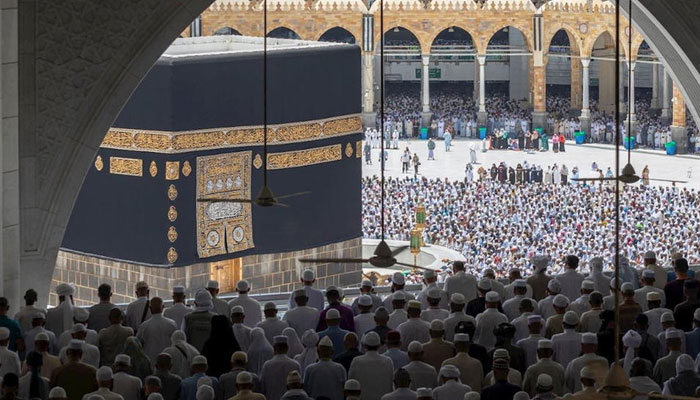
RIAD: Saudi Arabia is expected to curtail or cancel this year's Haj pilgrimage for the first time in its modern history, observers say, a dangerous decision as coronavirus cases increase.
Muslim nations are pressing Riyadh to make its long-overdue decision on whether the annual ritual will continue as scheduled in late July.
But as the kingdom negotiates a political and economic risk-laden appeal in a tinder region, time is running out to organize logistics for one of the world's largest mass gatherings. A large-scale Haj, which last year attracted some 2.5 million pilgrims, seems increasingly unlikely after authorities advised Muslims in late March to postpone preparations due to the rapidly spreading disease. "It is a shock between having a nominal Haj and discarding it entirely," said a South Asian official in contact with Saudi Haj authorities. A Saudi official said: "The decision will be made and announced soon."
Indonesia, the world's most populous Muslim nation, withdrew from the pilgrimage this month after pressuring Riyadh for clarity, and a minister called it a "very bitter and difficult decision."
Malaysia, Senegal, and Singapore did the same with similar announcements. Many other countries with Muslim populations, from Egypt and Morocco to Turkey, Lebanon, and Bulgaria, have said they are still awaiting Riyadh's decision. In countries like France, religious leaders have urged Muslims to "postpone" their pilgrimage plans until next year due to the prevailing risks.
The Haj, essential for Muslims without disabilities at least once in their lives, represents an important potential source of contagion since it takes millions of pilgrims to congested religious places.
But any decision to limit or cancel the event runs the risk of upsetting intransigent Muslims for whom religion trumps health concerns. It could also trigger renewed scrutiny of Saudi custody of Islam's holiest sites, the kingdom's most powerful source of political legitimacy.
A series of deadly disasters over the years, including a 2015 stampede that killed more than 2,300 worshipers, has drawn criticism for the management of the Haj kingdom. "Saudi Arabia is caught between the devil and the deep blue sea," said Umar Karim, a visiting fellow at the Royal United Services Institute in London. "The delay in announcing his decision shows that he understands the political consequences of canceling the Haj or reducing its scale."
The kingdom is "buying time" as it walks cautiously, the South Asian official said. "At the last minute, if Saudi Arabia says 'we are ready to do a full Haj', (logistically) many countries will not be in a position to participate," he said.
Amid an ongoing suspension of international flights, a reduced Haj with only local residents is a likely scenario, the official added.
Saudi Arabia managed to sustain the pilgrimage during previous Ebola and MERS outbreaks. But it is struggling to contain the virus amid a serious increase in daily cases and deaths since authorities began easing a national blockade in late May.
In Saudi hospitals, sources say intensive care beds are filling up fast and an increasing number of health workers are contracting the virus, as the total number of cases has exceeded 130,000. The deaths exceeded 1,000 on Monday.
To counter the increase, authorities this month tightened blockade restrictions on the city of Jeddah, the gateway to the pilgrimage city of Makkah.
"Haj is the most important spiritual journey in the life of any Muslim, but if Saudi Arabia continues in this scenario, it will not only put pressure on its own health system," said Yasmine Farouk of the Carnegie Endowment for International Peace. "It could also be largely responsible for fueling the pandemic."
A canceled or diluted Haj would represent a significant loss of revenue for the kingdom, which is already recovering from the twin shocks of the virus-induced slowdown and a drop in oil prices.
The smallest year-round Umrah pilgrimage was already suspended in March. Together, they add $ 12 billion to the Saudi economy each year, according to government figures.
A negative decision will likely disappoint millions of Muslim pilgrims around the world who often invest their life-long savings and endure long waiting lists to make the journey. "I can't help but be heartbroken, I've been waiting for years," said Indonesian official Ria Taurisnawati, 37, whiles sobbed. "All my preparations were ready, the clothes were ready and I received the necessary vaccine. But God has another plan."












No comments:
Post a Comment
Thank you for your comment.